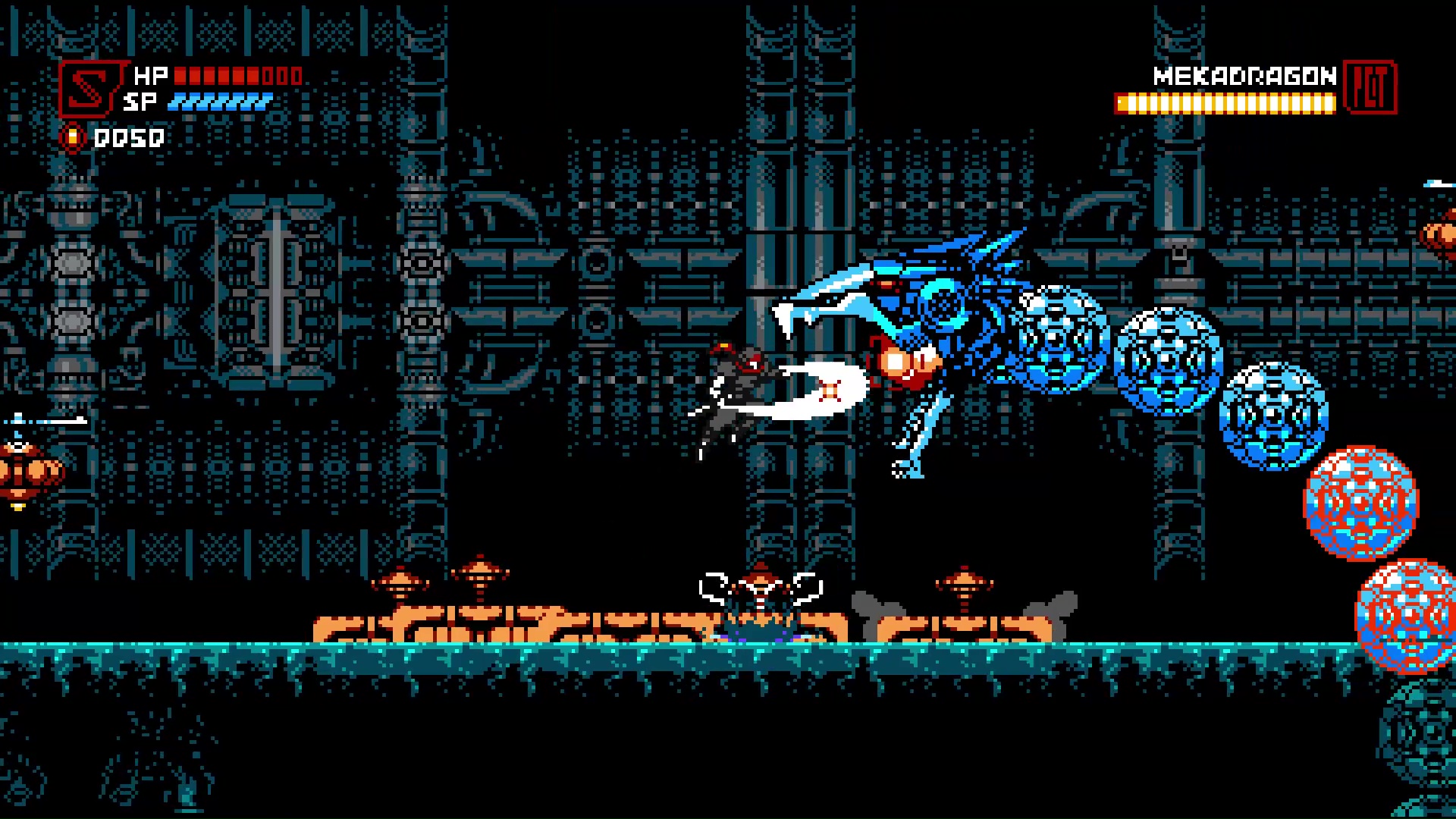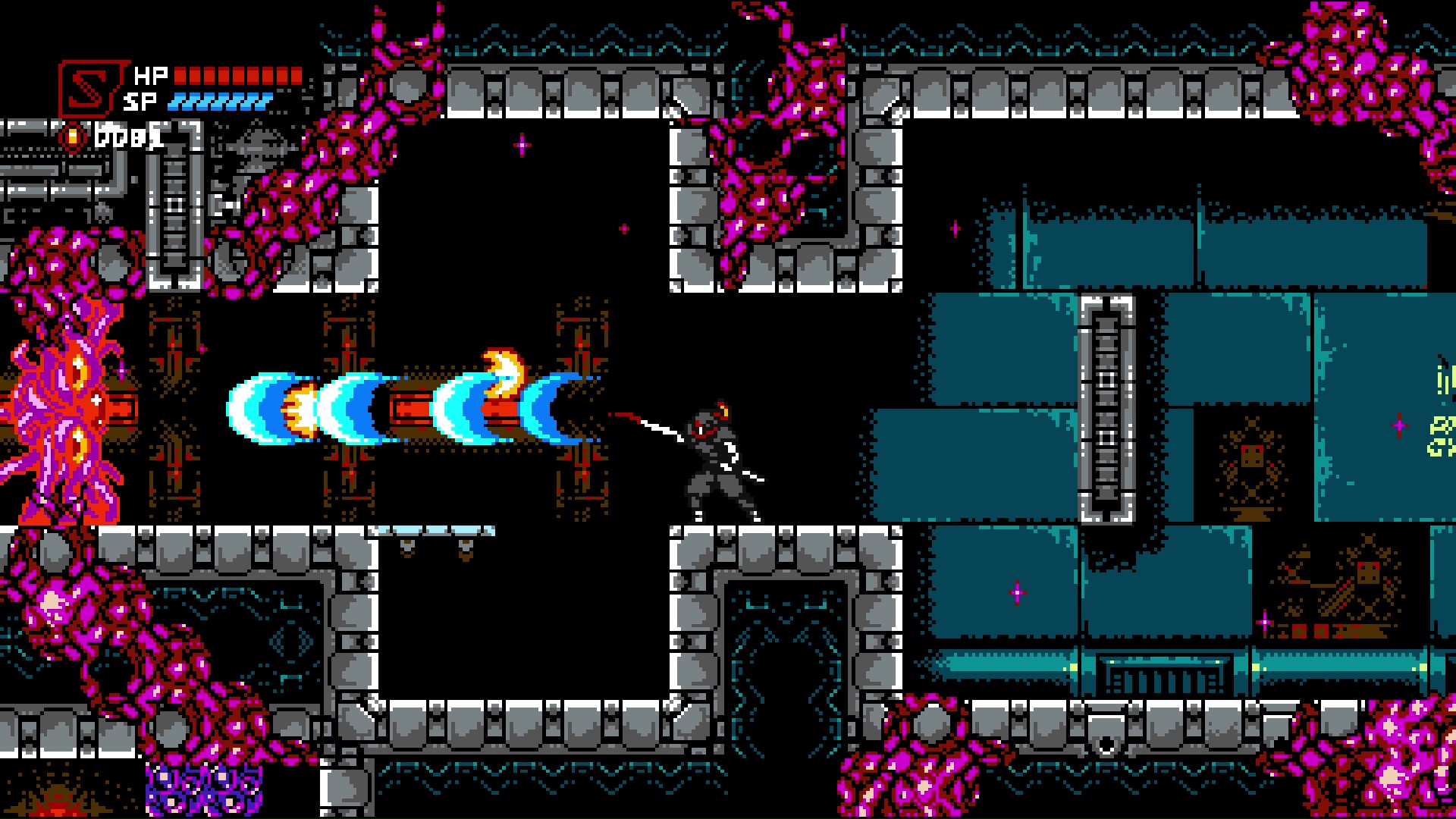There’s a lot of obvious care and time baked into every frame of Cyber Shadow. If I didn’t already know this was one guy’s years-in-the-making passion project, I’d definitely suspect as much.
It’s got that feeling you get sometimes from very polished fan games, where it’s wearing its influences on its sleeve, and every piece of it was meticulously built out of sheer love of the medium.
That medium, incidentally, is homicide. Cyber Shadow wants you dead.
Cyber Shadow Review: Ninja Gaiden’s Angry Cyberpunk Grandchild
Cyber Shadow is a dark 8-bit-styled action-platformer that takes much of its inspiration from the part of the original NES’ library that was big on ’80s-style future dystopias. Here, you’re a lone ninja on an impossible mission through the ruins of a once-great city, where everything in it is rusting, broken, corrupted, and trying to kill you.
The game was primarily made over the course of several years by a solo Finnish developer, Aarne “MekaSkull” Hunziker, with Shovel Knight developer Yacht Club Games only coming along near the end of the project to help polish and publish it. Cyber Shadow also has a genuinely great chiptune soundtrack, courtesy of Enrique Martin and Jacob “virt” Kaufman.
Hunziker has been fairly open about his influences in the last few years, citing games like Contra, Shadow of the Ninja, the level design of the Mario series, and Sunsoft’s 8-bit Batman. More than anything else, though, Cyber Shadow feels like a follow-up to the NES’s Ninja Gaiden trilogy. It’s got those games’ mood, storytelling style, and fluidity, but above all else, it places the same emphasis on flawless execution.
Every room in Cyber Shadow‘s extensive map is a long gauntlet of traps, enemies, and hazards, where every mistake costs you dearly if it doesn’t flat-out kill you. It’s a brutal, unforgiving game, but it’s fair, aside from a few rough edges.
In the Grim Darkness of the Cyber-Ninja Future
At the start of the game, a ninja named Shadow wakes up to find himself equipped with new cybernetic parts, with a dim memory of getting caught in an explosion. According to a nearby friendly robot, Shadow used to be a powerful member of the ninja clan that protected Meka City.
Now the city’s wreckage is ruled by an army of synthetic soldiers, the master of Shadow’s clan is missing, her father has gone full Dr. Wily, and the handful of ninja who are still alive are hooked up to machines, which drain them of the supernatural “essence” that fuels their abilities. Shadow’s only survived due to being made into a cyborg, and it seems like the only chance he’s got to save his clan is to find and free its master.
The strange innovation here is that Cyber Shadow plays its hand straight. It’s not winking at the camera like a lot of retro-styled games do; it takes its story seriously and doles out just enough of it at a time to keep the ball rolling. It’s sparse but effective, and it adds some real pathos to a game that would otherwise be a long series of death corridors.
From the start, Cyber Shadow makes it clear just how bad your odds are. You spend the first level crawling out of a hole in the ground with little more than a sword to your name, and the training wheels come off almost at once.
Cyber Shadow moves fast, with a degree of fluidity in motion that most of its 8-bit inspirations could only aspire to, and it uses all that speed to kill you as efficiently as possible. The first couple of rooms in Cyber Shadow are more challenging than the entire first half of a lot of the games like it.
It also seems to operate on the assumption that if you’re playing it at all, you’re generally familiar with its genre-pool. Cyber Shadow‘s enemies have obvious patterns you should be able to pick up at a glance if you’ve got any experience with this style of game, and if something looks like it’s capable of killing you, it is. Every area has a frankly gratuitous assortment of spikes, steam jets, acid, live current, and other hazards, populated by a killer assortment of deadly robots and mutants.
Cyber Shadow‘s map is broadly divided into particular areas, where you can go back and explore later as you pick up new tools and tricks; it splits the difference between a straight one-way trip like Ninja Gaiden and a wide-open “Metroidvania” map. Between every save point, you’ll run a series of vicious gauntlets, full of hand-placed enemies and clever ambushes, each one of which requires careful execution if you want to survive.
You can get upgrades that increase your base damage, maximum health, and spirit, but enemy damage output goes up faster than your life total ever will. The only real way to survive, particularly once you pass the 33% completion mark, is to focus on not getting hit at all. There’s no way to brute-force your way past Cyber Shadow with late-game upgrades or grinding; it’s all down to your personal skill and timing.
This is further reinforced by the special, extremely powerful items you can pick up, but which are immediately destroyed if you take three hits while using them. One of them in particular, a sort of rotating throwing star on a chain, is immediately reminiscent of the big orange throwing star subweapon in Ninja Gaiden, and it shocks me that it took this long for someone to make the “yo-yo shuriken” into an actual weapon in a modern game.
In general, the challenge level in Cyber Shadow is tough, but it’s fair. Most of the moments that frustrated me came from my wanting to speed through an encounter, but a little patience and observation usually did the trick.
The boss fights in particular seem like they’re initially impossible, and you’re likely to die in seconds on your first attempt, but they’re designed well enough that you can gradually get a feel for what you can and cannot do.
What annoys me a bit is that Cyber Shadow, like many of the games that inspired it, gives you a short invincibility window once you take a hit, but unlike those games, Cyber Shadow‘s window is very brief and doesn’t give you immunity to instant-death hazards. This is immediately evident early in the game, where there are several rooms that “challenge” you with not getting randomly punted into yet another acid pool/industrial shredder/wall of spikes. It’s more obnoxious than anything else.
The greater criticism, though, is that Cyber Shadow feels like its manual is missing. There are a lot of elements of its gameplay that you’re simply expected to find out on your own, via context or experimentation. Some are easy enough to understand, like how your Charge Beam assist has a visible gauge and an audio cue, but others are actively hidden from you.
There’s one sequence early on where you’re supposed to win a vertical footrace by using your recently-acquired down-slash move to bounce off of objects and gain altitude, but the game never actually tells you that you can do that unless you talk to a friendly ninja who’s halfway up the course.
Later, when you learn the ability to sprint, there’s a room you can’t get through unless you figure out by yourself that you can attack while sprinting to launch a long-range flying dash that functions as a long jump. This is the kind of thing that, back in the day, we used to have to find out from an eight-page spread in Nintendo Power (or from that layout disaster of a “secrets” section in really early issues of EGM), and to be honest, I didn’t miss it.
Cyber Shadow Review— The Bottom Line
Pros
- Beautiful sprite art
- Fluid controls
- Good soundtrack
- Tough, but usually fair…
Cons
- …although it’s often frustrating
- Some crucial systems go unexplained
- Made for serious retro-game nerds, and basically nobody else
- Projectile parries are a little too high-risk/low-reward for as often as the game emphasizes them
There’s a lot I like about Cyber Shadow. Its soundtrack is amazing, its environments are impressively designed, and its story steadily pulled me along. What holds it back, to some extent, is that it feels like it’s made for people who’ve already played a hundred games just like it. Cyber Shadow is a product made for fans of an incredibly specific sort of gaming experience, and effectively no one else.
It’s worth a look if you’re up for a serious challenge, but only the hardest of the hardcore need apply. I’m usually not up for this level of recreational masochism in my games, so if you are, feel free to add a mental point or two onto this score.
[Note: Yacht Club Games provided the copy of Cyber Shadow used for this review.]











Published: Jan 25, 2021 03:45 am